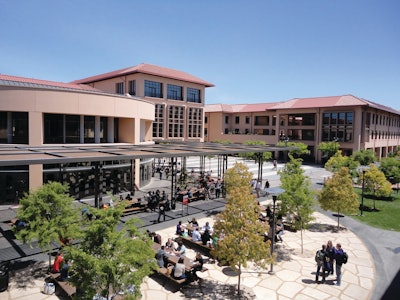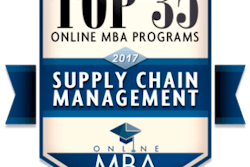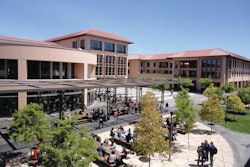
We’re all aware of Education 101: Math, English and Science. Heck, even some schools require some credit hours in Physical Education as a prerequisite to graduate high school. But were you aware of the vast amount of specialized supply chain education available at the college undergraduate and graduate level? This month, we bring you a snapshot of the national universities and institutions that are spreading supply chain education across campus via available degrees and continued education certification for current business professionals in the field.
The College of Business Administration, University of Tennessee - Knoxville (UTK)
Supply Chain Management Degrees Offered—Bachelor's degree with a major in logistics and supply chain management; Full-time MBA with a SCM concentration; an Executive MBA in Global Supply Chain Management; The Department of Marketing and Supply Chain Management offers two PhD program concentrations: one in Logistics & Supply Chain Management and one in Marketing.
Program YTD—Supply chain education (predecessor curriculums in transportation and logistics) offered at UTK since the 1930s, top ranked in the supply chain management field, #1 university globally in supply chain management research.
Average Number of Courses Required to Earn Minimum Certification—The Bachelor's degree with a major in logistics and supply chain management comprises five courses (15 semester hours) in the major with complementing coursework representing a collateral (minor) or dual concentration (total 24 semester hours); the 17-month Full-time MBA with a SCM concentration requires a minimum of nine total credit hours in the concentration; the Executive MBA in Global Supply Chain Management represents 45 credits (36-curriculum, 9-Organizational Action Project), the integrated curriculum is 60 percent core MBA course content, 40 percent global supply chain management course content. A comprehensive offering of Operations and Supply Chain Management non degree courses are offered through UTK's Center for Executive Education. Minimum course requirements are specified for certification including Lean and Six Sigma.
Average Enrollment Rate—500+ students in the undergrad logistics & supply chain program, 90+ students in the Full-time MBA program (20-25 in the SCM concentration), PhD program enrollment is highly competitive with an average of 15-20 doctoral students enrolled in the Logistics & Supply Chain and Marketing concentrations.
General Enrollment Requirements—For undergraduate students the completion of core academic subjects comprising 14 units (increasing to 17 units in 2013), GPA, standardized test scores, and other relevant factors; the Full-time MBA and Executive MBA program admissions requirements include submission of transcripts, minimum GPA, GMAT score report, Letters of Recommendation, essays, and relevant work experience; PhD program admissions requirements include MBA or equivalent masters degree, minimum GPA, minimum GMAT, and appropriate industry work experience.
How is the University of Tennessee keeping pace with the supply chain skill-sets necessary today?
“As one of the top ranked universities in the field of supply chain management, the University of Tennessee has a comprehensive offering of degree and non degree programs. We stay connected with industry through a very active ‘Executive in Residence’ program, internships for our students, and The Global Supply Chain Institute. The Global Supply Chain Institute is our center for supply chain management research, the supply chain audit practice and also directs the Global Supply Chain Forum. The Global Supply Chain Forum has over 60 corporate members representing a diverse industry base and meets annually in five world locations (North America, Western Europe, Central/Eastern Europe, Asia, Latin America). The Global Supply Chain Institute Advisory Board is comprised of over 40 VP's and EVP's of Supply Chain Management and meets twice annually to provide insights and guidance on key supply chain issues, curricula, and the research agenda.”—David Ecklund, University of Tennessee
Additional Resources—http://bus.utk.edu/cba/; http://globalsupplychaininstitute.utk.edu/; http://bus.utk.edu/scm/forums/; http://GlobalSupplyChainEMBA.utk.edu/; http://globalsupplychain.utk.edu/; http://ExecEd.utk.edu
Department of Supply Chain Management, W.P. Carey School of Business, Arizona State University
Management Degrees Offered—Bachelor of Science; MBA - Supply Chain Management (SCM) specialization; Graduate SCM Certificate; Ph.D.; Executive Education
Program YTD—The SCM department has existed as a department since 2000. Prior to that, procurement and logistics were in the Department of Business Administration and operations were in the Department of Management.
Number of Courses Offered within Program—13 Undergraduate Courses; 11 MS courses; and 4 PhD courses
Average Number of Courses Required to Earn Minimum Certification— BS – requires 120 hours with 21 hours of SCM courses; Full Time MBA SCM Specialization requires 18 hours of SCM electives and a 3 hour required course; Evening MBA SCM Area of Emphasis requires 9 hours of SCM courses and a 3 hour required SCM course; The SCM Graduate Certificate requires 15 hours of SCM courses; The SCM Professional Certificate (non-credit) requires 15 hours of SCM courses.
Average Enrollment Rate in Department Of Supply Chain Management— Approximate (per year) graduation rates: 200 undergraduates, 45 full-time MBA SCM Specialization students; 50 evening MBA SCM Area of Emphasis students; and 1 PhD student
General Requirements for Dpt. Of SCM Course— Undergraduate: We have a direct (from high school) admit program for those students - 1160 SAT Reasoning OR 25 ACT score, OR graduated in the top eight percent of high school class, OR an overall high school GPA of 3.60 in ASU competency courses (A=4.00). For those not directly admitted from high school, they can apply after completing 30 hours (including specific skill set classes) with a 3.0 or higher GPA.
What led ASU’s W.P. Carey School of Business to offer such a specialized department?— “ASU has long had significant expertise in supply management (procurement), logistics management and operations management—the three pillars of Supply Chain Management. ASU was forward thinking enough over a decade ago to realize that the importance of Supply Chain Management was increasing and that a discipline that included the three pillars was needed.”— John W. Fowler, PhD, Arizona State University
Website—http://wpcarey.asu.edu/Supply-Chain-Management/
Department of Supply Chain Management, Broad College of Business, Michigan State University
Management Degrees Offered— BA, Supply Chain; MS; MBA; PH.D.
Provided Supply Chain Management & Education YTD—Over 5+ decades
Number of Courses offered within MSU’s Dpt. of Supply Chain Management —67 courses
Average Number of Courses Required to Earn Minimum Certification—18 credit hours in supply chain
Average Enrollment Rate in MSU’s Dpt. of Supply Chain Management —Total number of average graduates per year: 300 undergraduates; 50 MBA’s; 20 Master of Science; 3 P.H.D.
General Enrollment Requirements for MSU’s Dpt. Of Supply Chain Management —Master of Science in Supply Chain Management (MSSCM): 36 credit hours
What led MSU’s Dpt. of Supply Chain Management to offer such a specialized department? How is it keeping pace with the supply chain skill-sets necessary today?—“We have one of the oldest programs available today as we started integrating logistics and procurement in the late ‘60s. We try to teach people a balanced perspective of procurement and production logistics, helping to create long-term senior managers who then have a wider perspective on what supply chain management is. While we have traditionally emphasized breadth in supply chain—and we still do—we try to improve its depth by taking out the redundancy and introducing integrated tools so people start to understand how the various functions of supply chain interact and trade work.”— Dave Closs, Chairperson, Department of Supply Chain Management, MSU
Website—http://supplychain.broad.msu.edu/
Supply Chain, Smeal College of Business, The Pennsylvania State University
Management Degrees Offered—Bachelor of Science in Business Administration with specialization in Supply Chain and Information Systems (SC&IS); MBA with a concentration in Supply Chain Management (SCM); Master of Professional Studies in Supply Chain Management (MPS/SCM)
Program YTD—Smeal College of Business’s Supply Chain and Information Systems (SCIS) department established in 2002; business logistics program available since 1964.
Number of Courses Offered—The undergraduate supply chain major provides six courses (18 credit hours); The MBA program provides four courses (12 credit hours); The MPS/SCM AACSB program provides 10 courses (30 credit hours)
Average Number of Courses Required to Earn Minimum Certification— Undergraduate supply chain majors are required to take six courses (18 credit hours) in supply chain management; The MPS/SCM AACSB program is a 30-credit, two-year online degree program which requires a minimum of five years of industry experience to enroll.
Average Enrollment Rate—500+ including third-year and fourth-year undergraduates (approximately 225-250 per third-year and fourth-year class)
General Enrollment Requirements Specific to the Supply Chain and Information Systems Department—Smeal College of Business admission requirements based on cumulative GPA and undergraduate prerequisites; requirements include resume, two essays, two recommendations, transcripts, GMAT and English language exams and a required invitational interview via webcam, phone, or in-person.
Website—http://www.smeal.psu.edu/
H. Milton Stewart School of Industrial & Systems Engineering, Georgia Institute of Technology
Engineering Degrees Offered—Master of Science in Supply Chain Engineering (MSSCE); Executive Master of Science in International Logistics & Supply Chain Strategy (EMIL-SCS); Master of Science in Industrial Engineering (MSIE)
Program YTD—The Stewart School of Industrial and Systems Engineering (ISyE) was originally established as a program at Georgia Tech in 1924 and became a school in 1945.
Average Enrollment Rate—The Stewart School has 1,187 undergraduate students; 264 Master’s; and 164 PhD’s.
Average Requirements to Earn Minimum Certification— The MSSCE one-year graduate program requires eight courses to earn degree; The EMIL-SCSincludes five two-week global residences over a period of eighteen months and requires a Bachelor's degree or equivalent and an accrued minimum of five years post-graduate business or military experience; the Master of Science in Industrial Engineering (MSIE) requires 30 credit hours within the manufacturing and logistics track.
Website— http://www.isye.gatech.edu/
Fisher College of Business, Ohio State University
Management Degrees Offered Specific to Supply Chain—Undergraduate program with a specialization in Logistics; MBA with concentration in Operations and Logistics Management; Master in Business Logistics Engineering (MBLE)
Program YTD—Ohio State University’s Fisher College of Business was established in 1916 and has offered supply chain enablement education since 1937.
Program/Coursework Requirements— Approximately five courses required at undergraduate level to earn Bachelor’s degree in specialty concentration; Applicants for the full-time MBA program majoring in Operations and Logistics Management are required to take 24 credit hours; Approximately 15 courses, three electives and attendance to a series of seminars offered in the College of Engineering's Integrated Systems Engineering are required for the MBLE program.
Average Enrollment Rate—250 students per year in undergraduate program; 150 students per year
General Enrollment Requirements— Acceptance to the undergraduate program with specialization is dependent upon the available enrollment capacity, size, quality of applicant and other factors; Applicants for the FTMBA program is contingent upon successful completion of the Kroll background verification, academic record, test scores, resume, letters of recommendation and more; Applicants for the MBLE degree program must have a baccalaureate degree from an accredited college or university, statement of purpose, test scores, resume, academic credentials and transcripts and more.
How is the Fisher College of Business keeping pace with the supply chain skill-sets necessary today?
“What tends to happen today is we solve one problem but create another one—it’s not just supply chain—it’s everywhere in business. We believe all business functions need to be involved in supply chain management. What we need in the U.S. is people who think horizontally and the managers that are most valuable are the ones who can implement processes that integrate across all business functions—including finance, marketing and sales.”—Douglas M. Lambert, PhD, Ohio State University
Website—http://www.fisher.osu.edu
This story is not all-inclusive and provides a snap-shot view of national educational programs which offer a supply chain focus.


![Pros To Know 2026 [color]](https://img.sdcexec.com/mindful/acbm/workspaces/default/uploads/2025/08/prostoknow-2026-color.mduFvhpgMk.png?auto=format%2Ccompress&bg=fff&fill-color=fff&fit=fill&h=100&q=70&w=100)







![Pros To Know 2026 [color]](https://img.sdcexec.com/mindful/acbm/workspaces/default/uploads/2025/08/prostoknow-2026-color.mduFvhpgMk.png?ar=16%3A9&auto=format%2Ccompress&bg=fff&fill-color=fff&fit=fill&h=135&q=70&w=240)





